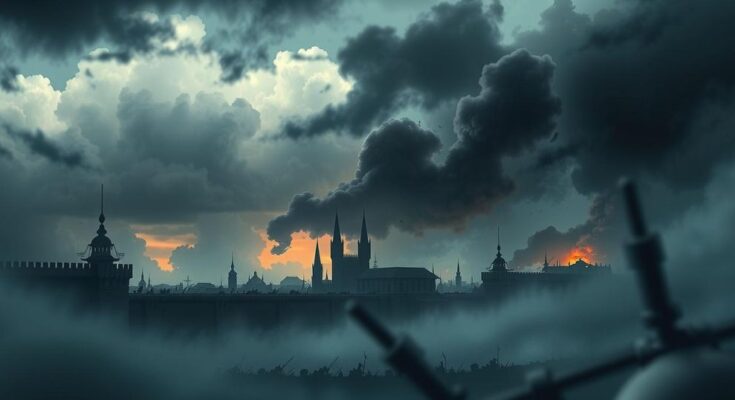M23 rebels, allegedly backed by Rwanda, have claimed control of Goma amidst escalating violence in eastern DRC. The DRC government decries this move as a declaration of war, exacerbating fears among local residents. The international community is calling for peace talks and the withdrawal of foreign troops as clashes lead to casualties.
Gunfire was reported across Goma, the largest city in eastern Democratic Republic of the Congo (DRC), after M23 rebels claimed to have seized control of it. This assertion came just hours following a United Nations Security Council call for the cessation of hostilities. The DRC government labeled this military advance as a “declaration of war” by Rwanda, particularly alarming for the city’s two million residents who fear escalating violence.
The M23 armed group made its declaration before a 48-hour ultimatum for Congolese forces to surrender expired. As panic spread, Goma residents were urged to remain calm, and soldiers were asked to gather at the central stadium. Eye witnesses confirmed reports of M23 rebels entering the city, captured on video as heavily armed individuals traversed the streets.
The ongoing conflict has displaced thousands in the resource-rich eastern DRC, raising alarm regarding a potential wider regional conflict, as M23 rebels have engaged in sustained conflict with the Congolese army and UN peacekeepers near Goma. This battle is part of a protracted crisis rooted in decades of ethnic strife and regional rivalries creating one of the world’s worst humanitarian emergencies.
In a video statement, the Congolese government spokesperson, Patrick Muyaya, emphasized the necessity of civilian protection, describing the situation as a state of war. Following increasing hostilities, the DRC severed diplomatic relations with Rwanda and sought international sanctions against it.
In light of the escalating situation, Kenya convened a meeting, urging both the DRC President Felix Tshisekedi and Rwandan President Paul Kagame to engage in peace talks. Kenya’s President William Ruto emphasized the need for a peaceful resolution, reflecting international concerns about the ongoing violence.
An emergency UNSC meeting underscored the gravity of the situation, with DRC’s Foreign Minister condemning the presence of Rwandan troops as an overt violation of sovereignty and a “declaration of war”. In contrast, Rwanda refuted the DRC’s accusations, arguing that the ongoing violence presents a threat to its national security.
UN analysts report that Rwanda has deployed between 3,000 and 4,000 soldiers to support the M23 in the DRC conflict. The UNSC called for the withdrawal of such “external forces” while omitting direct references to Rwanda’s involvement. Following these developments, numerous peacekeepers have lost their lives in the intensifying clashes.
The ongoing conflict in eastern DRC has a complex history involving regional rivalries, ethnic tensions, and the presence of various armed groups. The M23 rebellion is rooted in these dynamics and is fueled by regional politics, particularly with Rwanda’s alleged support for the rebels. Armed conflicts in this area have persisted for over thirty years, leading to significant humanitarian crises, mass displacements, and threats to regional stability. The situation has drawn international concern, prompting calls for peace and intervention.
The recent capture of Goma by M23 rebels, alleged to be backed by Rwanda, has intensified the already volatile situation in eastern DRC. This development has been condemned by the DRC government, which views it as an act of war. International efforts for peace talks and resolutions are underway, indicating a critical juncture in addressing the long-standing conflicts affecting the region. As military actions escalate, the humanitarian impact continues to raise alarms.
Original Source: www.aljazeera.com




